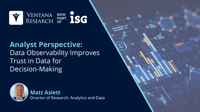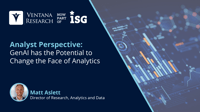About the Analyst

Matt Aslett
Matt leads the expertise in Digital Technology covering applications and technology that improve the readiness and resilience of business and IT operations. His focus areas of expertise and market coverage include: analytics and data, artificial intelligence and machine learning, blockchain, cloud computing, collaborative and conversational computing, extended reality, Internet of Things mobile computing and robotic automation. Matt’s specialization is in operational and analytical use of data and how businesses can modernize their approaches to business to accelerate the value realization of technology investments in support of hybrid and multi-cloud architecture. Matt has been an industry analyst for more than a decade and has pioneered the coverage of emerging data platforms including NoSQL and NewSQL databases, data lakes and cloud-based data processing. He is a graduate of Bournemouth University.
I am happy to share insights gleaned from our latest Buyers Guide, an assessment of how well software providers’ offerings meet buyers’ requirements. The Data Platforms Ventana Research Buyers Guide is the distillation of a year of market and product research by ISG and Ventana Research.
Read More
Topics:
data platforms,
Analytics & Data,
analytic data platforms,
Operational Data Platforms
I previously wrote about the ongoing importance of event brokers and event management in enabling enterprises to adopt event-driven architecture and event stream processing. Many enterprises adopt EDA as the design pattern for maximizing events to deliver real-time business processes. There are many advantages to using EDA, including a cultural shift away from batch processing towards real-time analysis and decision-making.
Read More
Topics:
Analytics & Data,
Streaming Data & Events,
Data Intelligence
I previously wrote about the potential for generative artificial intelligence technology to enhance the integration sector by facilitating outcome-driven approaches for automatically generating integration pipelines in response to declared business requirements. The use of GenAI in data and application integration remains nascent, but multiple software providers are embracing the potential for GenAI to improve the productivity of integration experts and facilitate self-service integration by...
Read More
Topics:
Analytics & Data,
Data Intelligence
I recently wrote about the role data observability plays in generating value from data by providing an environment for monitoring its quality and reliability. Data observability is a critical functional aspect of Data Operations, alongside the development, testing and deployment of data pipelines and data orchestration, as I explained in our Data Observability Buyers Guide. Maintaining data quality and trust is a perennial data management challenge, often preventing organizations from operating...
Read More
Topics:
data operations,
Analytics & Data,
Data Intelligence
Enterprises are embracing the potential for artificial intelligence (AI) to deliver improvements in productivity and efficiency. As they move from initial pilots and trial projects to deployment into production at scale, many are realizing the importance of agile and responsive data processes, as well as tools and platforms that facilitate data management, with the goal of improving trust in the data used to fuel analytics and AI. This has led to increased attention on the role of data...
Read More
Topics:
data operations,
AI & Machine Learning,
Analytics & Data
The emergence of generative artificial intelligence (GenAI) has significant implications at all levels of the technology stack, not least analytics and data products, which serve to support the development, training and deployment of GenAI models, and also stand to benefit from the advances in automation enabled by GenAI. The intersection of analytics and data and GenAI was a significant focus of the recent Google Cloud Next ’24 event. My colleague David Menninger has already outlined the key...
Read More
Topics:
Analytics,
natural language processing,
AI & Machine Learning,
data platforms,
Analytics & Data,
Generative AI
I recently wrote about the development, testing and deployment of data pipelines as a fundamental accelerator of data-driven strategies as well as the importance of data orchestration to accelerate analytics and artificial intelligence. As I explained in the recent Data Observability Buyers Guide, data observability software is also a critical aspect of data-driven decision-making. Data observability addresses one of the most significant impediments to generating value from data by providing an...
Read More
Topics:
Analytics,
Data Ops,
data operations,
AI & Machine Learning,
Analytics & Data,
Generative AI,
Machine Learning Operations
I previously wrote about the potential for rapid adoption of the data lakehouse concept as enterprises combined the benefits of data lakes based on low-cost cloud object storage with the structured data processing functionality normally associated with data warehousing. By layering support for table formats, metadata management and transactional updates and deletes as well as query engine and data orchestration functionality on top of low-cost storage of both structured and unstructured data,...
Read More
Topics:
Analytics,
data platforms,
Analytics & Data
Many organizations have adopted DataOps to apply agile development, DevOps and lean manufacturing processes to the development, testing, deployment and orchestration of data integration and processing pipelines. The most likely ultimate outcome of these pipelines is the analytics reports and dashboards enterprises rely on to make business decisions.
Read More
Topics:
Analytics,
Analytics & Data,
Data Intelligence
Analytics software is used by business analysts and decision-makers to facilitate the generation of insights from data. It encompasses business intelligence and decision intelligence software, including reports and dashboards as well as embedded analytics and the development of intelligent applications infused with the results of analytic processes. Analytics software enables enterprises to improve business outcomes by operating more efficiently, accelerating product development and enhancing...
Read More
Topics:
Analytics,
AI,
Analytics & Data,
Generative AI





















